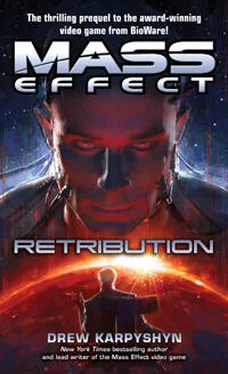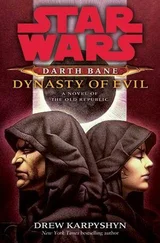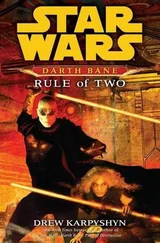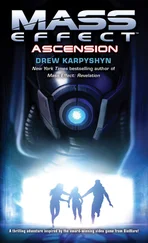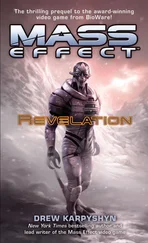“You’re being implanted with self-replicating nanides. Their numbers will increase exponentially as they graft themselves onto your neurons and synapses. Eventually they will spread throughout your body, transforming you into a tool of the Reapers. You will be repurposed into a synthetic-organic hybrid unlike anything any of the Council races could possibly create.
“We need to study this transformation. Learn from it so we can defend ourselves against this alien technology. It’s the only way we can hope to stand against the Reapers.”
Grayson heard the words, but he could no longer understand them. His mind was being ripped apart.
He could feel the nanides spreading through his head: alien tendrils wrapping themselves around his very thoughts and identity, strangling them out of existence until everything went black.
“He’s catatonic,” Dr. Nuri barked out. “Stop the procedure!”
The Illusive Man sat impassively as the scientists scurried to shut the equipment down. He waited silently as Dr. Nuri checked the screens monitoring Grayson’s vitals.
“It’s okay,” she assured him after a few tense minutes. “No permanent damage.”
“What happened?”
“It was too much for him to handle. It overwhelmed his system; he shut down.”
“You pushed him too far.”
“We knew the initial implantation would be traumatic,” she reminded her boss.
“I told you to be conservative with your estimates,” he reminded her. “We can’t afford any mistakes. The Reaper technology is too powerful.”
“We have no baselines,” she answered defensively. “No data to extrapolate from. It’s all theoretical.
Nobody’s ever tried anything even remotely close to this kind of procedure before!”
“That’s why we must err on the side of caution.”
Chastised, Dr. Nuri replied, “Of course. I’m sorry. It won’t happen again.”
“You said there was no permanent damage?” the Illusive Man asked, satisfied he’d made his point.
“He should rest for a few days. After that we can continue.”
The Illusive Man nodded.
“Seal the room, but keep him hooked up to the monitors. I want him under observation at all times.”
He stood up to leave.
“We’ve reached phase two of this project,” he reminded the doctor. “The subject isn’t human anymore. He’s something alien now. Something dangerous.
“If you see anything unusual or unexpected — if you have any doubt or uncertainty at all — exterminate him immediately. I’d rather see the entire project fail than risk having this thing we’ve created break free.
Do I make myself clear?”
Kai Leng stepped out from the shadows where he had been silently observing the experiment.
“I understand,” he assured the Illusive Man. “Grayson will never leave this facility alive.”
Admiral David Anderson was, above all else, a soldier. He understood the true meaning of words like honor, duty, and sacrifice. For twenty-five years he had served the Alliance without question or regret, giving up the chance for love and a family in order to protect humanity as it struggled to find its place in the galactic community. He’d served multiple tours of duty on godforsaken worlds. Fought in more battles than he could remember. Put his life on the line countless times without any hesitation.
Whatever his mission, whatever his assignment, he’d followed orders to the best of his ability and without complaint. But if he had to spend one more meal in the diplomats’ lounge listening to the elcor ambassador drone on about his volus counterpart, he was going to go snap.
“With true sincerity,” Calyn said in the ponderous style of his species as he sidled up to Anderson’s table, “it is good to see you here.”
The elcor were a large, heavyset species from the high-gravity world of Dekunna. Standing nearly eight feet at the shoulder, they used their long forelimbs to help their short back legs support their massive girth, giving them the appearance of gray-skinned gorillas walking about on all fours. They had no neck; Calyn’s large, flat head seemed to be pushed back into his shoulders.
Though he was still technically an admiral in the military, Anderson hadn’t seen active duty in several years. With the restructuring of the Citadel Council, he’d become one of humanity’s key political representatives — a “reward” for all his years of dedicated service.
Over the past few months Anderson and Calyn had both been involved in a series of ongoing trade negotiations between the Alliance, elcor, volus, and turians. Anderson was little more than a figurehead at the talks; the Alliance had plenty of real politicians to handle the delicate negotiations. But that hadn’t stopped Calyn from striking up a conversation whenever they met outside the conference room.
Every day, when Anderson would leave his Presidium office and come to the lounge for lunch, the elcor ambassador would invariably show up and plot a slow but relentless course over to his table to join him. Upon arrival, he would immediately begin grumbling about the volus ambassador.
“Without exaggeration,” the elcor said, jumping right into it as he settled in across the table from Anderson, “Din Korlak is the rudest individual I have ever dealt with.”
“I know,” Anderson said through gritted teeth as he shoveled a forkful of food into his mouth. “You’ve told me. Many times.”
As a result of evolving in such a high-gravity environment, the elcor moved — and spoke — with a painful deliberateness that Anderson found maddening. Listening to Calyn vent his frustrations was like hearing a recording played back at one-quarter speed.
His frustration was compounded by the fact that the elcor had no concept of how to use inflection or tone in their speech. Among their own kind they relied on subtle body gestures and subvocal sounds below the threshold of human hearing to convey meaning and subtext. Unfortunately, these nuances weren’t relayed through the universal translators that allowed the various species of the Citadel to communicate with each other. As a result, anything the elcor said invariably came across as a flat monotone devoid of any and all feeling.
To make matters worse, their faces were almost featureless. Their small, wide-set eyes and the vertical skin flaps where their mouths should have been revealed no discernible emotion, making it nearly impossible to read their mood.
“Genuine apologies,” Calyn droned in reply to Anderson’s objection. “It is not my intention to irritate you.”
Anderson bit his lip and considered his next words carefully. Even without any contextual clues, it was clear he’d offended his dining companion. And even though he couldn’t understand all the complexities of the negotiations, he knew enough to realize that they needed the elcor on their side.
The volus and the turians had a long history of cooperation; centuries ago Din Korlak’s people had petitioned for military protection from the turians in exchange for preferential economic status. If the Alliance was going to make any headway in the negotiations, they needed the full support of Calyn’s people.
“It’s not you,” Anderson lied. “The negotiations are just wearing me down.”
“Understandable,” the elcor replied. “Our jobs can be very stressful.”
That’s the understatement of the century, Anderson thought.
He was a man of action, not words. He liked to have a plan and implement it. But in the world of politics nothing was ever that simple. Among the ambassadors and Council members he was out of his element, drowning in a sea of bureaucratic red tape.
Calyn had accepted Anderson’s apology, but it was impossible to tell if he was still feeling slighted. In an effort to smooth things over, the admiral decided to offer his own feelings on the volus ambassador.
Читать дальше
